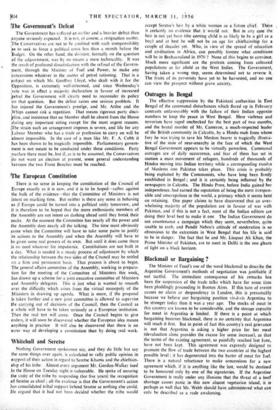Blackmail or Bargaining ?
The Minister of Food's use of the word blackmail to describe the Argentine Government's methods of negotiation was justifiable if not tactful. The immediate consequence of his remarks has been the suspension of the trade talks which have for some time been ploddingly proceeding in Buenos Aires. If this turn of events causes no alarm or despondency in London, this is presumably because we believe our bargaining position vis-a-vis Argentina to be stronger today than it wet a year ago. The stocks of meat in this country are known to be considerable, and the storage capacity for meat in Argentina is limited. If there is a point at which bargaining becomes blackmail, there is no certainty that Argentina will reach it first. But in point of fact this country's real grievance is not that Argentina is asking a higher price for her meat (devaluation alone provides the excuse for some increase), as that the terms of the existing agreement, so painfully reached last June, have not been kept. This agreement was expressly designed to promote the flow of trade between the two countries at the highest possible level ; it has degenerated into the barter of meat for fuel. There is a natural reluctance to make concessions for a new agreement which, if it is anything like the last, would be destined to be honoured only by one of the signatories. If the Argentine Government is really under any illusions that the threat of a beef shortage causes panic in this now almost vegetarian island, •it is perhaps as well that Mr. Webb should have administered what can only be described as a rude awakening.






































 Previous page
Previous page